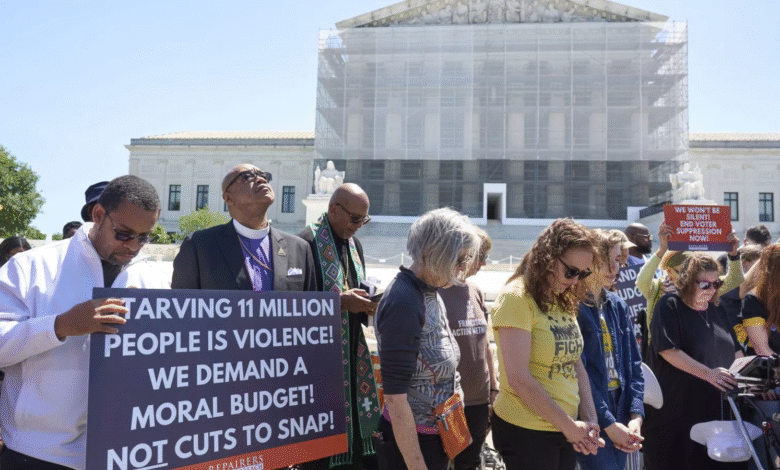
A Republican bill to shift part of the cost of federal food stamps to states suffered a major setback after a senator ruled it violated Senate rules.
Why It Matters
The filibuster sought to reduce federal spending on the Supplemental Nutrition Assistance Program (SNAP), which reaches more than 40 million low-income Americans who rely on food assistance. This transfer would have shifted a significant portion of SNAP costs to the states, requiring them to pay at least 5%—and possibly more—of the benefit costs. Analysts have warned that this could lead to significant cuts in food assistance.
The senator’s decision increases pressure on the bill’s supporters, who must find other ways to finance the tax cuts without jeopardizing food assistance, Medicaid, or other federal support programs.
What To Know
This provision, a cornerstone of Republican efforts to offset the costs of President Donald Trump’s $1 trillion tax and budget bill, was deemed unacceptable under Senate rules, prompting Republican leaders to expedite consideration of this colossal bill.
Senator Elizabeth MacDonough’s decision came as the bill was being prepared for a vote. While her opinions are advisory, they are rarely ignored in legislative practice. Republican lawmakers are now seeking to achieve further savings while continuing to advance Trump’s legislative priorities despite this setback.
Parliamentarian Ruling and Byrd Rule Compliance
MacDonough declared that the SNAP cost-sharing plan was inconsistent with Senate budget reconciliation rules, including the Byrd Rule, which prohibits tying certain policy measures to budget bills. This proposal would have shifted billions of dollars in SNAP costs from the federal government to the states, creating a new financial obligation for state governments and threatening millions of dollars in coverage.
House Passes Bill with GOP SNAP Cuts
In May 2025, the House passed the largest tax and spending cut package yet, along party lines, including a provision requiring states to fund at least 5% of SNAP benefits, and more if error rates increase. The Supplemental Nutrition Assistance Program (SNAP) provision in the House-passed bill was expected to save approximately $128 billion. Republican leaders hoped these savings would offset the bill’s $4.5 trillion in tax cuts and new spending.
In addition to SNAP, the plan includes extending and expanding tax credits for individuals and businesses, new work requirements for Medicaid recipients, cuts to federal health and nutrition programs, increased funding for the military and border security, and the elimination of tips for service workers.
GOP Paths Forward
Republican leaders, including Senate Agriculture Committee Chairman John Boozman (Arkansas), have said they are exploring various options to keep the bill on track while finding savings elsewhere. The options range from amending the controversial Supplemental Nutrition Assistance Program (SNAP) provision, eliminating it altogether, or risking a procedural vote requiring 60 votes—an unlikely scenario in the current Senate.
Impact on SNAP Recipients
The plan includes extending employment requirements for seniors (up to age 65), a provision that remains in the bill. Democrats and anti-hunger activists have warned of the negative consequences for those in need: more than 3 million people are expected to lose access to food stamps, according to estimates from the Congressional Budget Office.
Additional Rulings Expected
The senator is also expected to vote on other elements of the bill, including restrictions on immigrant eligibility for food assistance and changes to federal agencies. Other decisions are expected to influence the final legislation.
What People Are Saying
Minnesota Senator Amy Klobuchar, the ranking Democrat on the Senate Agriculture, Nutrition, and Forestry Committee, said, “We will continue to fight to protect families in need,” opposing the shifting of SNAP costs to states, which she said would lead to significant benefit cuts.
Arkansas Senator John Boozman, chairman of the Senate Agriculture Committee, said Republicans are “exploring options” to comply with Senate rules while supporting SNAP recipients.
What happens next?
Senate Republicans are expected to revise the bill to align with House resolutions or drop the contested SNAP provisions. Further decisions from the chancellor on other elements of this massive bill are expected before the Senate’s final vote.







